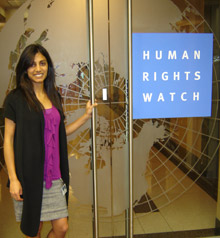Human Rights Watch, New York

Aneesa Walji at the headquarters of Human Rights Watch |
While international human rights law has made great strides in the past decades, there is a continuing need to promote mechanisms of justice and accountability. The International Justice (IJ) Program at Human Rights Watch is dedicated to promoting both state and individual accountability. By assessing ongoing developments in international criminal law and the promotion of institutional accountability within states, the Program advocates for positive change in international law and global governance.
Given recent developments, much of the IJ Program's work this past summer was focused on the International Criminal Court (ICC). I was tasked with monitoring and critically analyzing news reports and press releases relating to Sudan and Omar al-Bashir, the first sitting head of state to be indicted by the ICC. In addition to media monitoring, I conducted research on a novel question of law related to the ICC and the principle of complementarity outlined in the Rome Statute. After extensive reading and the construction of creative legal arguments, I finally presented my analysis to the IJ Program.
In response to issues as they arose, I was assigned various other tasks on a needs basis. For example, I wrote a memo comparing the definition of international crimes and modes of liability found in the Rome Statute to those found in the Bangladesh International Crimes (Tribunals) Act 1973. I also conducted research on the rules surrounding provisional release in international criminal law and after following a portion of the Charles Taylor trial, reported key issues, themes and statements back to IJ Program counsel. Moreover, I had numerous opportunities to attend meetings and conferences, including a UN Security Council briefing by the ICC Prosecutor Luis Moreno-Ocampo.
I learned a great deal not only about international criminal law but also about the nuances of the political background on which it operates. Of course, I also learned about the art of advocacy design and practice. Human Rights Watch is an organization renowned for its advocacy and so I was thankful to be regularly invited to meetings with staff members discussing whether to intervene on issues and if so, how. The frank discussions that took place were an eye opener. It was enlightening to understand the important considerations that shape advocacy strategies.
In summary, this internship has provided me with a deep and critical exposure to the field of international criminal law and human rights advocacy, which will inform and shape my career over the years to come. I am extremely grateful to the International Human Rights Program at U of T for funding this internship and staff members at Human Rights Watch for making it such an exciting experience.

